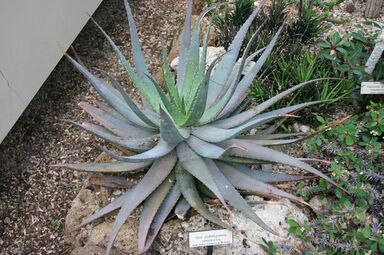Biology:Aloe globuligemma
| Witchdoctor's aloe | |
|---|---|

| |
| Habit in the Pretoria National Botanical Garden | |
| Scientific classification | |
| Kingdom: | Plantae |
| Clade: | Tracheophytes |
| Clade: | Angiosperms |
| Clade: | Monocots |
| Order: | Asparagales |
| Family: | Asphodelaceae |
| Subfamily: | Asphodeloideae |
| Genus: | Aloe |
| Species: | A. globuligemma
|
| Binomial name | |
| Aloe globuligemma Pole-Evans
| |
| Synonyms | |
| |
Aloe globuligemma, commonly known as the witchdoctor's aloe,[1] is a species of flowering plant in the family Asphodelaceae. It is native to southern Africa where it occurs in semi-desert and dry bushland. It is an evergreen, succulent, perennial plant. The plant forms large, dense clumps. It is harvested from the wild for local medicinal use.
Taxonomy
Aloe globuligemma is a species in the family Asphodelaceae, subfamily Asphodeloideae.[2] The species derived its name from Latin language globulus meaning "little ball", and gemma, meaning "bud"[3] referring to the globular flower buds.[4]
Description
The first description by Illtyd Buller Pole-Evans was published in 1915.[5]
Plant morphology
Aloe globuligemma grows building short stems up to 50 cm (20 in) in length, forming great, dense clumps by sprouting. The creeping stems are up to 50 cm (20 in) long.
About 20 of the lance shaped leaves form a rosette. The leaves are from 45–50 cm (18–20 in) long and from 8–9 cm (3.1–3.5 in) wide.[6]
The milky white, pale brown topped teeth at the leaf margins are 2 mm (0.1 in) long in 10 mm (0.4 in) intervals, mostly pointing to the leaf's top.
Distribution
Aloe globuligemma is found in Botswana, Zimbabwe and in the South Africa n provinces Limpopo and Mpumalanga in hot dry areas and bushlands at elevations from 600–1,325 m (2,000–4,300 ft),[7] often in large colonies, in bare or sparsely grassed places, often in eroded areas and in open deciduous woodland.[8]
Uses
Aloe globuligemma is used in traditional African medicine.[7] A leaf infusion is taken traditionally to for stomach ache, for venereal diseases, and as an abortifacient.
Gallery
Leaf rosette in the New York Botanical Garden, Bronx
References
- ↑ "Aloe globuligemma". ITIS Report. https://www.itis.gov/servlet/SingleRpt/SingleRpt?search_topic=TSN&search_value=950483#.
- ↑ Stevens, P.F. (2001). "Asphodeloideae". Angiosperm Phylogeny Website. http://www.mobot.org/MOBOT/research/APweb/orders/asparagalesweb.htm#Asphodelaceae. Retrieved 2016-06-10.
- ↑ Urs Eggli; Leonard E. Newton (2010). Etymological Dictionary of Succulent Plant Names. Berlin/Heidelberg: Springer. p. 95. ISBN 978-3-642-05597-3.
- ↑ "Flora of Zimbabwe". http://www.zimbabweflora.co.zw/speciesdata/species.php?species_id=113890.
- ↑ Transactions of the Royal Society of South Africa. Volume 5, 1915, p. 30.
- ↑ Urs Eggli (1993). Glossary of Botanical Terms with Special Reference to Succulent Plants including German equivalents. Richmond: British Cactus and Succulent Society. p. 41. ISBN 978-0-902099-22-7.
- ↑ 7.0 7.1 Arnold, T.H.; Prentice, C.A.; Hawker, L.C.; Snyman, E.E.; Tomalin, M.; Crouch, N.R.; Pottas-Bircher, C. (2002). Strelitzia. pp. 1–203.
- ↑ "Aloe globuligemma". http://tropical.theferns.info/viewtropical.php?id=Aloe+globuligemma.
Bibliography
- Susan Carter, John Jacob Lavranos, Leonard Eric Newton, Colin C. Walker, Aloes. The definitive guide, Publisher Kew Publishing,Royal Botanic Gardens, Kew, 2011, ISBN:978-1-84246-439-7, pages=459
- Leonard Eric Newton, editor Urs Eggli, Aloe globuligemma, Sukkulenten-Lexikon. Einkeimblättrige Pflanzen (Monocotyledonen), Verlag=E, Stuttgart, 2001, ISBN:3-8001-3662-7| pages=141 (German)
- Massey, Jimmy R.; Murphy, James C. (1996). "Vascular plant systematics". NC Botnet. University of North Carolina at Chapel Hill. Retrieved 19 January 2016.
- R J Ferry. Inflorescences and Their Names. The McAllen International Orchid Society Journal.Vol. 12(6), pp. 4–11 June 2011
- Carter, S., Lavranos, J.J., Newton, L.E. & Walker, C.C. (2011). Aloes, The Definitive Guide Royal Botanic Gardens, Kew ISBN:978 1 84246439 7 Page 459. (Includes a picture).
- Mapaura, A. & Timberlake, J. (eds) (2004). A checklist of Zimbabwean vascular plants Southern African Botanical Diversity Network Report No. 33 Sabonet, Pretoria and Harare Page 84.
- Setshogo, M.P. (2005). Preliminary checklist of the plants of Botswana. Sabonet Report no. 37. Sabonet, Pretoria and Gaborone Page 115.
- West, O. (1974). A Field Guide to the Aloes of Rhodesia. Longman, Salisbury Pages 80 – 84. (Includes a picture).
Wikidata ☰ Q1294406 entry
 |



